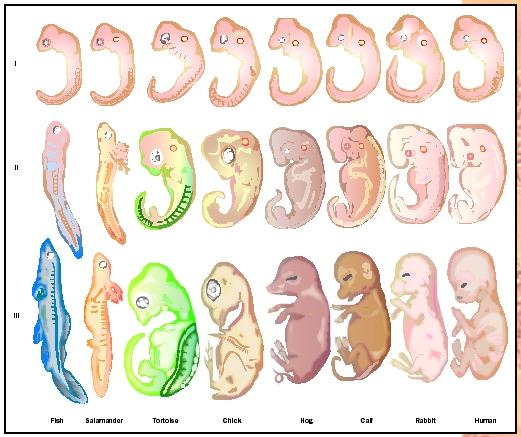Predispositions sure can screw up your outlook. I've always wondered how twisted the brain was of the Victorian, or Edwardian, or Georgian gentleman who decided that the queen bee was the queen bee. Clearly, some fucked up predispositions about how the world works, based upon a rather silly social convention such as the concept of pedigree could result in such an error.
Ah, but we've had all this for years. It's the eventual abandonment that suggests some progress... in progress.
Take, for example, development. I mean biological development, as in development of the fetus, but the concept can be expanded outside of biology.
There are basically two schools of thought on development. One school is that of preformationism. Put simply, and ultimately, it is the "God did it" school of thought. The idea there is that order exists from the get-go, and that all subsequent growth and differentiation is just an enfolding of that order. Like what they beleived back in the 17th century, those little sperm homunculi, there's already a little you ready to go in that sperm and it just gets bigger. And, apparently, so are all your descendants inside of your sperm and eggs, like little Russian matrushka dolls, all the way back to Eve, I guess.
Well, yes, that's all very, very silly isn't it? Oh, true it seems intuitive and even commonsensical, like a balanced budget amendment. But looked at closer, you realize it's all pretty stupid and more likely to hobble you than do any real good - like the balance budget amentdment. And yet there are plenty of current scientific views that encompass this rather medieval metaphysical outlook, that the order is already there, a latent order just waiting to unfold, to be made manifest.
The other school of thought (and, duh, obviously the one I prefer) is that of epigenesis. The epigenetic story goes that, in the case of, say, you, that you did not exist, either latently or manifestly, when Mom and Dad grunted you into existence. In other words, that fertilized egg that you came from? That wasn't you. You came into existence through the development itself. In other words, rather than just a pre-programmed unfolding, you were a creative process all the way through. You still are, and isn't that a relief? There's still time to change.
Until recently, Epigenesis had a very tough time going up against preformationism. Mainly because it was very hard to explain how you got the complexity of a baby out of the simplicity of an egg using the known laws of physics and chemistry. Generally, proponents of epigenesis had to a lot of hand-waving, and no small amount of question begging that suspiciously sounded like spooky stuff - magical thinking, and New Age garbage talk.
But, over time, some really ingenious natural experiments by clever 19th century people like Wilhelm Roux and Hans Driesch slowly knocked underlying tenets from under the preformationist base. Like, moving cells around in a zygote. One would expect, if you grab a cell destined to be a tooth, and you move it to the foot, that a creepy baby would be born that had teeth for toes. That didn't happen (and no, they didn't use human embryos). The tooth cell turned itself into a toe cell, and the baby was born normal. How did preformationism take this and other experiments into account?
Well, it couldn't.
Of course, this didn't prove epigenesis correct. (And rightly so, despite politicians reliance upon this particular logical fallacy, proving one idea wrong does not make some other idea right). It merely caused a retreat of preformationism to more subtle forms (which became more sophisticated too, as first chromosomes, then genes, then DNA were figured out). The control and order got pushed into smaller and smaller stuff, until you have the genes-as-software metaphor.
Nevertheless, over time, evidence began to build for epigenesis that did not rely upon spooky stuff to explain it. A great deal of the theoretical support structure came out of chaos and complexity theory, e.g. self-organization. But more so, increasing empirical studies of everything from cell differentiation to cancer research has pretty much confirmed that development itself is where it is all at.
And all the silly stuff about "genetic blueprints" and "genetic recipes", and the metaphors geared towards computer programming examples, and genes-as-software, should, with any luck, be deposited into the waste bin where they belong.
Genes are obviously not controlling anything, or at least not for very long. They are hardware along with the rest of the cell. In fact, it turns out even genes that are used to produce proteins (the original descriptor for genes) are subject to control by micro-RNA particles, that determine 1) whether the protein the gene codes for will actually be expressed, and 2) whether the gene will be allowed to transcribe more proteins.
Not surprisingly, the mechanisms within a cell are far, far more interesting and complex than, say how they were described by the likes of Dawkins in a woefully out-of-date 1980s popular science book.
(Really, was all this just a dig at that asshole? Not really, but I couldn't resist).
I am, now, very interested in the current version of epigenetics, involving DNA methylation (and demethylation), histone modifications, RNA interference, and cell-to-cell molecular communications. All of this is very promising stuff, not only as explanation, but also for therapies - ranging from anti-cancer treatments, to anti-aging treatments. But, more importantly, it provides a much more sophisticated - and open-minded - set of theoretical predispositions.
I impatiently await more research.
Tuesday, July 19, 2011
Subscribe to:
Post Comments (Atom)



No comments:
Post a Comment